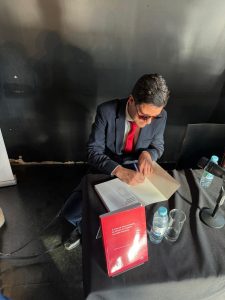Pedro Oliveira, a labour law expert at INESC TEC, completed his PhD at the Faculty of Law of the University of Coimbra in October 2024, becoming the first blind student to achieve this distinction. His thesis is now a published work, available in bookstores; A Crise da Harmonização do Direito do Trabalho na União Europeia, published by Almedina, provides a timely analysis and critical reflection on the development of EU labour law.
The author explained that “in practice, the process of normative harmonisation is based on the creation of standardised European legal rules,” and that the absence of said harmonisation in certain areas can lead to workers across different EU countries experiencing unequal legal protection and being treated unfairly. This legal fragmentation can also create uncertainty around which laws apply, leading to insecurity in the legal landscape.
 Although the book is technical in nature and primarily aimed at legal professionals, it also offers readers a valuable insight into how the European Union’s legal system works – particularly in the employment law domain. Pedro Oliveira demonstrates how national governments no longer have sole authority over labour law, as the EU legal system now plays an increasingly influential – and often decisive – role in shaping this area.
Although the book is technical in nature and primarily aimed at legal professionals, it also offers readers a valuable insight into how the European Union’s legal system works – particularly in the employment law domain. Pedro Oliveira demonstrates how national governments no longer have sole authority over labour law, as the EU legal system now plays an increasingly influential – and often decisive – role in shaping this area.
“In today’s landscape, labour law in the European Union has taken on a dual dynamic,” the author explained. “There are clear signs of legislative convergence in some areas but also points of rupture and trends that could be seen as regressions – especially regarding the level of harmonisation being pursued – which, as the thesis aimed to show, has been minimal or minimalist.”
The work draws attention to how national labour laws are becoming increasingly shaped by decisions made at the EU level. Despite this, Pedro Oliveira believes that society remains largely unaware of this influence. “Many Portuguese citizens don’t fully grasp the legal-labour field or the impact on their lives – although many do have an intuitive understanding of their basic rights, particularly those related to their employment contract, salary, holidays, and working hours,” he explained. Nevertheless, he noticed that “this awareness tends to be more limited when it comes to the growing influence of EU law in these matters, whether through legislation or the interpretative role of the Court of Justice.”
The book was recently launched at the Estádio Cidade de Coimbra bookshop and is now available for purchase.


 News, current topics, curiosities and so much more about INESC TEC and its community!
News, current topics, curiosities and so much more about INESC TEC and its community!